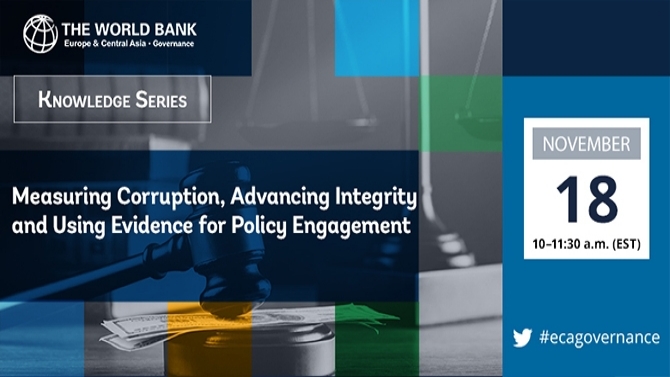PRESENTATIONS: Indicators for Action and Change | Measuring Corruption, Advancing Integrity and Using Evidence for Policy Engagement
_______________
Well into the third decade of global anticorruption, good governance tools have proliferated. At the same time, available indices reflect only limited change for most countries, suggesting that they are not sensitive enough to reflect trends. New research and instruments have been developed that seek to assess the specific governance contexts and the fit of anticorruption approaches to enable selecting appropriate and tailored reforms. Improved measurement allows smarter interventions at the national, sectoral and organization level. Through focusing on de facto (practices) and not de jure (formal regulation) we discover how far we have managed with the last two decades of transparency reforms, and how far still we need to go.
The following examples of instruments will be covered during this session:
The Index of Public Integrity is a composite index consisting of six components: judicial independence, administrative burden, trade openness, budget transparency, e-citizenship and freedom of the press. It aims to give an objective and comprehensive picture of the state of control of corruption in 117 countries.
The Transparency Index (T-index) is a brand-new assessment of real transparency mattering for anticorruption in 128 countries.
The OECD’s new Public Integrity Indicators measures the strength of the regulatory and institutional framework, implementation of key practices, and related outcomes through 75 indicators grouped in six sets according to the normative framework of the OECD Council Recommendation on Public Integrity. The indicators are still under construction but the first set of results on “strategy” will be presented. See chapter 12 in the 2021 Government at a Glance and the video of the launch at the 2021 OECD Global Anti-Corruption and Integrity Forum
The indicators for the Principles of Public Administration, run by SIGMA, a joint initiative of the OECD and the EU, is an example how a regional scope allows use of mixed methods, including administrative and survey data. The framework consists of 52 indicators, composed of more than 340 individual sub-indicators and over 1,000 criteria, enabling a high variety of different ways to measure the state of play in a public administration and progress in implementing reforms. The methodology is accessible here. SIGMA is completing its monitoring reports for 2021 and a pre-view of the data will be presented. Past evaluation reports are accessible here.
During this session, the speakers will discuss how policy engagement and research have shaped the focus and methodology for the indicators, and how the indicators are in turn being used for policy discussions and engagement in country by the EU and others.
RESOURCES
Websites for new measurements of integrity and transparency, including country forecasts at: www.againstcorruption.eu, www.europam.eu , www.opentender.eu , www.integrity-index.org
Suggested readings: Mungiu-Pippidi and Fazekas: https://www.researchgate.net/publication/353039461_How_to_define_and_measure_corruption
OECD 2021 Government at a Glance (chapter 12) for Public Integrity Indicators data (or see launch video), and Government at a Glance: Western Balkans for SIGMA data (read policy chapter and/or see launch video)
Seven Steps to Control of Corruption (jstor.org)
